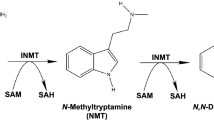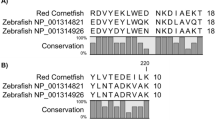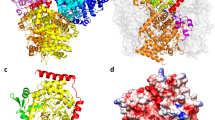Abstract
IN a previous survey of the distribution in Nature of betaine-homocysteine-methyl-transferases, these enzymes were found in the livers of all vertebrate animals investigated1,2. They could not be detected in any of a number of lower animals examined. The search for the enzymes has since continued, which has led to the discovery of a betaine–homocysteine–methyl-transferase in a member of the Mollusca, the pond mussel Anodonta cygnea. The work on which this observation is based will be briefly reported here.
This is a preview of subscription content, access via your institution
Access options
Subscribe to this journal
Receive 51 print issues and online access
$199.00 per year
only $3.90 per issue
Buy this article
- Purchase on Springer Link
- Instant access to full article PDF
Prices may be subject to local taxes which are calculated during checkout
Similar content being viewed by others
References
Ericson, L.-E., Fourth Int. Cong. Biochem., Vienna (1958), Abstracts of Communications, p. 45.
Ericson, L.-E., Acta Chem. Scand., 12, 1541 (1958), and to be published.
Steele, B. F., Sauberlich, H. E., Reynolds, M. S., and Baumann, C. A., J. Biol. Chem., 177, 533 (1949).
McCarthy, T. E., and Sullivan, M. X., J. Biol. Chem., 141, 871 (1941).
Ackermann, D., and List, P. H., Naturwiss., 10, 354 (1959).
Author information
Authors and Affiliations
Rights and permissions
About this article
Cite this article
ERICSON, LE. Transmethylation in Anodonta cygnea . Nature 185, 465–466 (1960). https://doi.org/10.1038/185465a0
Issue Date:
DOI: https://doi.org/10.1038/185465a0
Comments
By submitting a comment you agree to abide by our Terms and Community Guidelines. If you find something abusive or that does not comply with our terms or guidelines please flag it as inappropriate.



